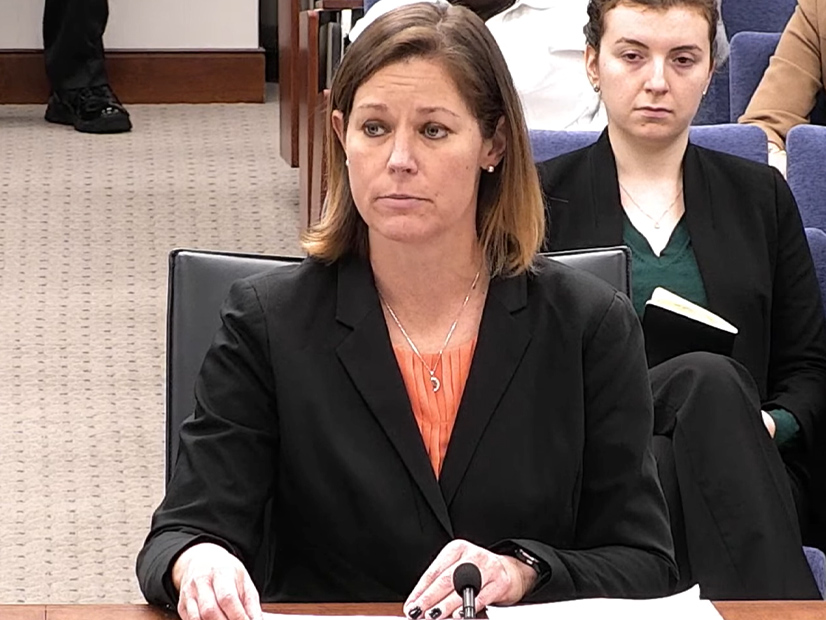At its open meeting on Thursday, FERC significantly advanced NERC’s remit to address the challenges posed by the growth of solar and wind generation on the bulk electric system, directing the organization to develop new reliability standards for inverter-based resources (IBRs) (RM22-12) and create a plan for registering entities that own IBRs (RD22-4). The commission also approved two new reliability standards involving IBRs.
In a presentation on the two orders to NERC, Leigh Faugust of FERC’s Office of General Counsel told commissioners that the moves are necessary because of the rapidly changing nature of the BES’ generation mix. Existing regulations standards were designed for an electric grid where energy primarily came through synchronous generation resources like coal, nuclear and hydropower; however, new generation types like wind and solar — as well as battery energy storage systems — connect to the grid through inverters.
“According to NERC, the rapid integration of IBRs is the most significant driver of grid transformation on the bulk power system,” Faugust said. “NERC has reported that solar and wind IBR projects in all stages of development may total upwards of 860 GW of added nameplate capacity over the next decade.”
Although IBRs “are being increasingly incorporated into the bulk power system and distribution grids,” reliability standards largely have not yet been updated to reflect the new normal, Faugust said. In addition, current rules defining which resources qualify as part of the BES — and thus have to register with NERC, follow its reliability standards and respond to NERC alerts — do not apply to many smaller IBRs that are connected to the transmission system.
Registration Criteria, Standards up for Revision
The first of the commission’s orders concerns these registration criteria. It directs NERC to submit a work plan within 90 days detailing how it will identify and register owners and operators of IBRs that are connected to the BPS and “in the aggregate have a material impact” on reliable operation, but are not currently required to register with NERC.
Under the draft order, NERC will be required to complete modifications to its registration processes no later than 12 months after the commission approves its work plan. The organization will have to identify all relevant IBR owners and operators within 24 months after approval, and register them no later than 36 months after approval.
FERC’s order provides some flexibility to NERC by allowing it to decide which of the reliability standards’ requirements IBR owners and operators will have to comply with upon registration; the commission gave the example that new registrants might be required only to comply with “provisions pertaining to facility interconnections and studies, protection systems, modeling, voltage support and frequency response,” along with newly passed standards. NERC’s decisions in this regard will be subject to the commission’s approval.
In its second order, FERC issued a draft Notice of Proposed Rulemaking intended to deal with “the impacts of IBRs on the reliable operation of the” BPS, which the commission said are not adequately addressed by current reliability standards.
Four specific perceived gaps in the current standards are targeted by the draft NOPR. First, the commission said that IBR owners and operators “do not consistently share IBR planning and operational data”; when they do share such data, they are “often inaccurate or incomplete.” Data that should be shared, according to FERC, include location, capacity, telemetry, control setting, ramp rates and a wide range of additional information.
The commission quoted a report from NERC’s Inverter-based Resource Performance Subcommittee (IRPS) that found that NERC’s current standards are at least in part to blame for the situation. According to the report, MOD-032-1 (Data for power system modeling and analysis) leaves “the level of detail and data formats up to each [transmission planner] and [planning coordinator] to define.”
The next gap in the standards is in the validation of data and creation of system models. FERC’s NOPR said that no current standard includes “unregistered IBR modeling data and parameters and IBR-DER [distributed energy resource] aggregate modeling data and parameters to ensure reliability.” While NERC has recommended on several occasions that stakeholders coordinate on providing accurate modeling data, the lack of a mandatory standard means that it is difficult to ensure such collaboration happens.
Another shortcoming in NERC’s current set of standards is planning and operational studies, which Faugust pointed out are not currently required to include models with validated IBR data. Finally, FERC pointed to a lack of IBR performance requirements, such as ride-through capability, that are not currently covered by reliability standards.
FERC’s draft NOPR would direct NERC to submit a compliance filing within 90 days of the effective date of the final rule; the filing would outline a comprehensive standards development and implementation plan for new or modified reliability standards to address the reliability gaps. Comments in response to the draft NOPR are due 60 days after its publication in the Federal Register, with reply comments due 30 days later.
The commission’s third IBR-related action in Thursday’s meeting was the approval of two new reliability standards: FAC-001-4 (Facility interconnection requirements) and FAC-002-4 (Facility interconnection studies). Proposed by the IRPS in a March 2020 white paper, the new standards add requirements that interconnection requirements and studies “evaluate the reliability impacts of newly interconnecting facilities and changes at existing facilities.”
In a statement, NERC said it “appreciates FERC’s focus on reliability matters and will continue to work with FERC and stakeholders toward assuring the reliability of the North American bulk power system.”




